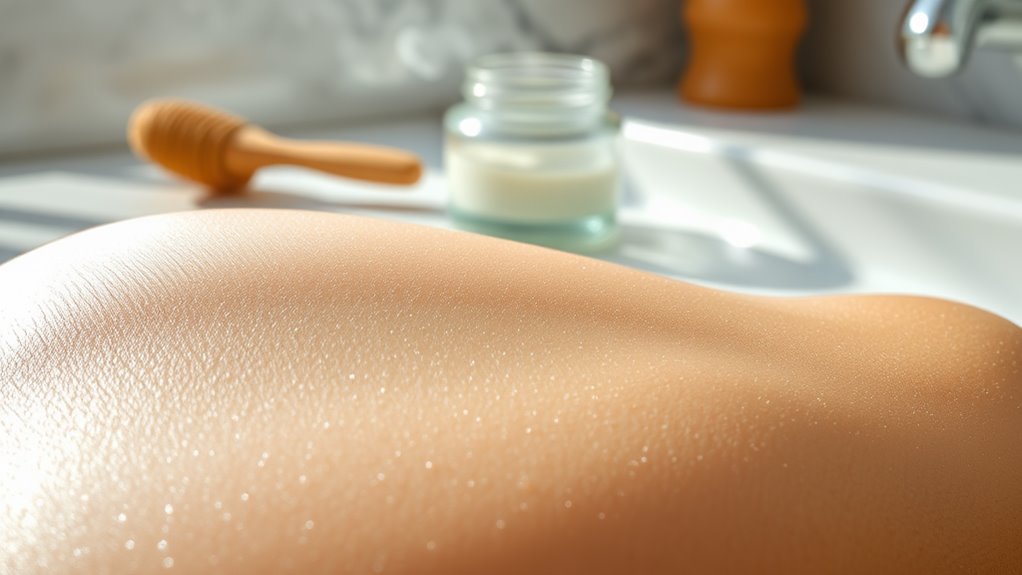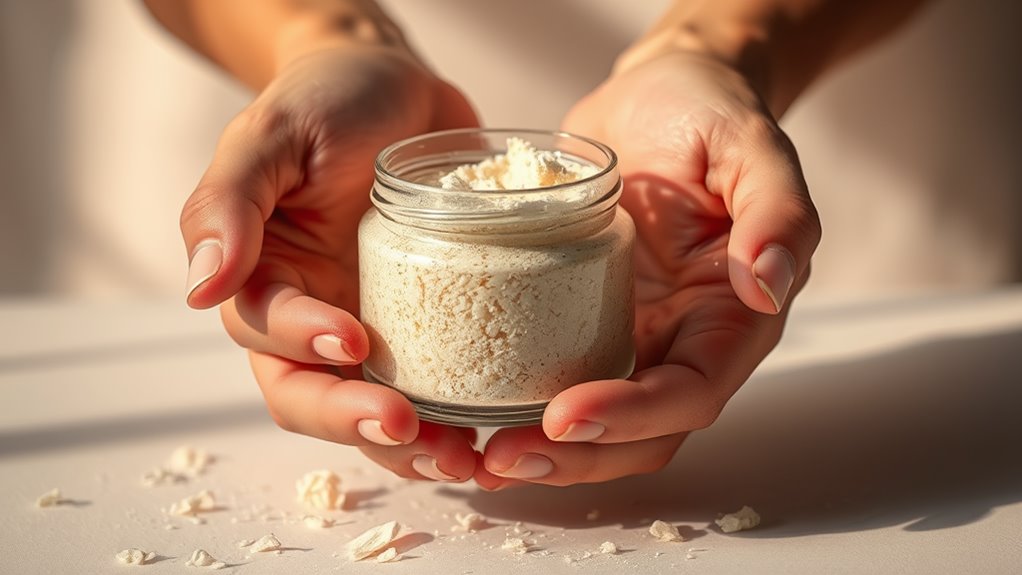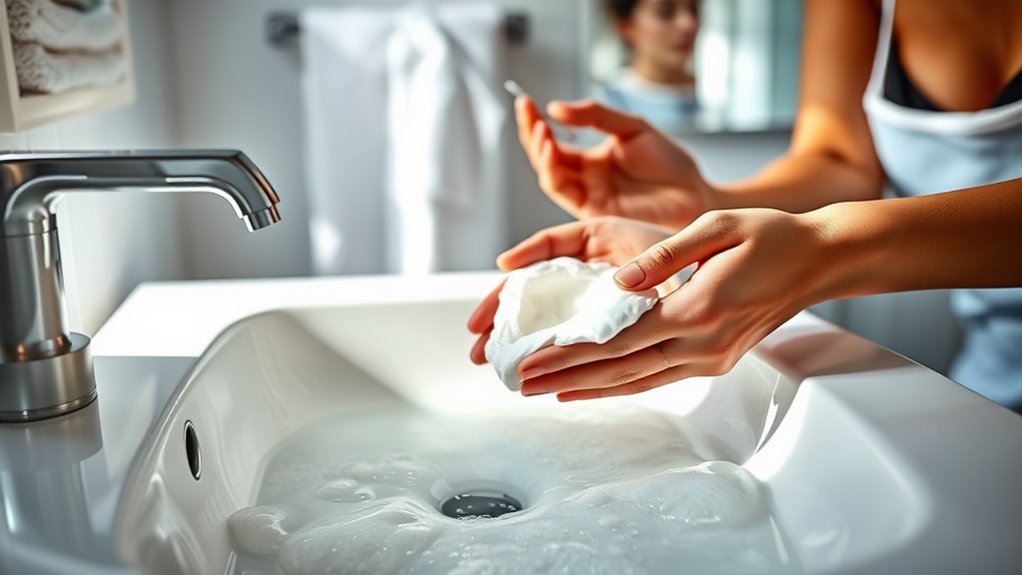What Dermatologists Say About Daily Exfoliation
Dermatologists highlight the importance of exfoliation for vibrant skin, as it removes dead skin cells and enhances cellular turnover. While daily exfoliation can improve texture and brightness, it’s vital to know your skin type to choose the appropriate exfoliant. Over-exfoliation can lead to irritation, increased sensitivity, and compromised skin barriers. Typically, they recommend limiting exfoliation to two to three times a week based on your skin’s needs. Learn more about how to safely integrate exfoliation into your routine.
Key Takeaways
- Daily exfoliation is generally not recommended as it can disrupt the skin barrier, leading to increased sensitivity and irritation.
- Dermatologists suggest limiting exfoliation to 2-3 times a week for oily skin and once a week for dry or sensitive skin.
- Over-exfoliation can result in excessive oil production, breakouts, and premature aging signs due to compromised skin health.
- Choosing the right exfoliant based on skin type is crucial; chemical exfoliants may be beneficial for oily skin, while gentle options are better for sensitive skin.
- Always hydrate with a soothing moisturizer after exfoliation and monitor skin reactions to avoid irritation.
Understanding Exfoliation: What It Is and Why It Matters
Exfoliation is a critical skincare process that involves the removal of dead skin cells from the surface of your skin.
Understanding the daily exfoliation truth is essential for achieving optimal skin health. This process enhances cellular turnover, allowing fresh, healthy skin to emerge while preventing clogged pores and dullness.
Regular exfoliation can improve the effectiveness of your skincare products by facilitating better absorption. However, the frequency and method of exfoliation must be tailored to your skin type to avoid irritation or damage.
Chemical exfoliants, such as AHAs and BHAs, work at a molecular level, while physical exfoliants provide immediate results. Recent studies indicate that daily exfoliation can lead to over-exfoliation, causing sensitivity and irritation in some individuals.
Mastering exfoliation techniques can significantly elevate your skincare regimen, leading to a more vibrant and youthful complexion.
Benefits of Daily Exfoliation According to Dermatologists
Daily exfoliation offers significant benefits that dermatologists emphasize for maintaining healthy skin. It promotes skin renewal by removing dead cells, allowing your complexion to appear fresher and more vibrant. Additionally, it enhances product absorption, ensuring that your skincare products penetrate more effectively for optimal results. Regular exfoliation helps prevent rough and uneven skin texture, which can be a consequence of neglecting this crucial step in your skincare routine.
Promotes Skin Renewal
Engaging in a consistent exfoliation routine can significantly enhance your skin’s renewal process. By removing dead skin cells, you promote the growth of new, healthy cells.
This leads to a multitude of benefits, including:
- Improved texture: Your skin feels smoother and looks more refined.
- Brightened complexion: Regular exfoliation reveals a more radiant skin tone.
- Reduced appearance of fine lines: New cells help diminish the visibility of aging signs.
- Minimized clogged pores: Fewer dead cells mean less chance of breakouts.
Dermatologists emphasize that incorporating daily exfoliation into your regimen can be a game-changer for skin health.
However, it’s essential to choose the right method and frequency tailored to your skin type for optimal results.
Enhances Product Absorption
One of the key benefits of incorporating daily exfoliation into your skincare routine is its ability to enhance product absorption.
By removing dead skin cells and unclogging pores, you create a smoother surface that allows active ingredients in your serums and moisturizers to penetrate deeper and work more effectively.
When you exfoliate, you’re not just sloughing off the old; you’re preparing your skin to receive the nutrients it craves.
This increased absorption can lead to improved hydration, greater efficacy of antioxidants, and the enhanced performance of other topical treatments.
As a result, you’ll notice more visible improvements in your skin’s texture, tone, and overall health, making daily exfoliation a vital step in achieving your skincare goals.
Potential Risks of Daily Exfoliation
While daily exfoliation can offer benefits, it also carries potential risks that you should be aware of.
Regularly removing skin cells might disrupt your skin barrier, leading to increased sensitivity and irritation. Additionally, over-exfoliation can result in long-term damage, making it crucial to find a balance that works for your skin. Over-exfoliating can lead to skin health issues, which may require effective recovery methods to restore your skin’s natural balance.
Skin Barrier Disruption
Daily exfoliation can significantly impact the skin’s protective barrier, leading to potential risks that might outweigh its benefits.
When you exfoliate too frequently, you may encounter the following concerns:
-
Compromised Barrier Function: Over-exfoliation can strip essential lipids, weakening your skin’s defense against environmental stressors.
-
Increased Trans-Epidermal Water Loss: A disrupted barrier can lead to excessive moisture loss, resulting in dryness and dehydration.
-
Higher Infection Risk: A weakened barrier may allow pathogens to penetrate, increasing susceptibility to infections.
-
Inflammation: Daily exfoliation can trigger inflammatory responses, leading to redness and irritation.
Understanding these risks is crucial for making informed decisions about your skincare routine, ensuring you prioritize your skin’s health and integrity.
Increased Sensitivity Risk
Exfoliating your skin too frequently can lead to increased sensitivity, making it more reactive to various stimuli. This heightened sensitivity manifests as redness, irritation, or discomfort, particularly when exposed to environmental factors like sun or harsh weather.
Your skin’s barrier becomes compromised, reducing its ability to shield against irritants and allergens. Consequently, you may notice an uptick in reactions to products you previously tolerated well.
Daily exfoliation can also disrupt the skin’s natural pH balance, further exacerbating sensitivity. To mitigate these risks, consider alternating exfoliation days or opting for gentler methods tailored to your skin type.
Over-Exfoliation Consequences
When you exfoliate too often, you risk over-exfoliation, which can lead to several adverse effects on your skin.
These consequences can undermine your skincare efforts and compromise your skin’s health:
-
Increased Irritation: Your skin may become red, inflamed, or itchy.
-
Compromised Barrier Function: Over-exfoliation can weaken the skin’s protective barrier, making it more susceptible to environmental damage.
-
Excess Oil Production: Your skin may respond by overproducing oil, leading to breakouts and congestion.
-
Premature Aging: Stripping away too many skin cells may accelerate the appearance of fine lines and wrinkles.
To maintain optimal skin health, it’s crucial to balance exfoliation frequency with your skin type and condition.
Always listen to your skin’s needs.
How to Choose the Right Exfoliant for Your Skin Type
How can you determine the best exfoliant for your skin type? Start by identifying whether your skin is oily, dry, combination, or sensitive.
For oily skin, consider chemical exfoliants like salicylic acid, which penetrates pores and controls sebum production.
If your skin is dry, opt for gentle physical exfoliants or lactic acid, which hydrates while exfoliating.
For combination skin, a balanced approach using both physical and chemical exfoliants can yield effective results.
If you have sensitive skin, focus on mild exfoliants, such as enzymatic options, to avoid irritation. Over-exfoliating can lead to barrier damage, so it’s crucial to monitor your skin’s reaction to any new product.
Always perform a patch test when introducing a new product, and adjust frequency based on your skin’s response.
Signs You May Be Over-Exfoliating
Are you noticing unexpected changes in your skin’s texture or appearance? It could be a sign that you’re over-exfoliating. Here are four key indicators to watch for:
-
Increased Sensitivity: Your skin feels more reactive to products and environmental factors.
-
Redness and Inflammation: Persistent redness or inflammation may signal irritation from excessive exfoliation.
-
Dryness or Flakiness: Paradoxically, over-exfoliation can lead to dryness, as it strips away essential oils.
-
Breakouts: You might experience more acne or clogged pores, as the skin attempts to compensate for damage.
Excessive exfoliation can also lead to long-term damage that hinders your path to achieving a smooth and radiant complexion. If you recognize these signs, consider reassessing your exfoliation routine.
Balancing exfoliation is crucial for maintaining healthy skin without compromising your skin barrier.
Recommended Exfoliation Frequency for Different Skin Types
Understanding the right exfoliation frequency for your skin type can significantly enhance your skincare routine and prevent issues related to over-exfoliation.
For oily skin, exfoliating two to three times a week is often beneficial, as it helps control excess sebum and unclog pores.
If you’ve got combination skin, aim for once or twice a week, focusing on oilier areas.
For dry or sensitive skin, limit exfoliation to once a week to avoid irritation and maintain moisture levels.
Mature skin may also benefit from weekly exfoliation, emphasizing gentle methods to promote cell turnover without causing damage.
Always consider your skin’s response and adjust accordingly, as individual needs may vary based on factors like climate and product usage.
Expert Tips for Safe and Effective Exfoliation
While exfoliation can offer numerous benefits for your skin, it’s crucial to approach the process with care to avoid potential damage.
Here are expert tips for safe and effective exfoliation:
-
Choose the Right Exfoliant: Select between physical or chemical exfoliants based on your skin type and sensitivity.
-
Limit Frequency: Exfoliate no more than 2-3 times a week, adjusting based on your skin’s response.
-
Hydrate After Exfoliation: Apply a soothing moisturizer post-exfoliation to replenish moisture and minimize irritation.
-
Monitor Skin Reaction: Pay attention to how your skin reacts; redness or irritation signals that you may need to reduce frequency or change products.




